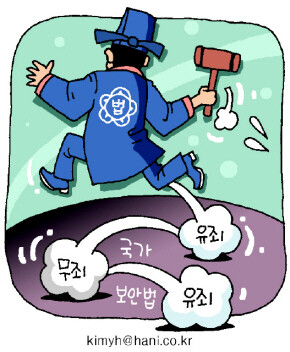hankyoreh
Links to other country sites 다른 나라 사이트 링크
Courts continue arbitrary rulings on Article 7 of the National Security Law

The court decisions regarding the possession of materials that praise designated “anti-state” groups including North Korea under the National Security Law’s Article 7, which is regarded as one of the law’s most noxious articles, are still arbitrary and confusing. As a result, voices of concern have been raised regarding misuse of the National Security Law and distrust of the judiciary.
The first criminal division of the Seoul High Court ruled on Nov. 27 that a song praising the North Korean leadership, even though it was an instrumental with no words, still counts as a material that praises for North Korea. The Court overturned the original acquittal of 35-year-old Mr. Song, the head of the public relations committee of the Solidarity for the Practice of the South-North Joint Declaration, who was indicted for storing an instrumental song praising late North Korean leader Kim Il-sung and his son, entitled, “I Pledge Allegiance to the Family Line” on a USB drive.
The bench said, “The song in question, a march or classical piece with a positive melody, is not far from conveying the message the title.” The bench said also said, “Since there are many songs used to convey a certain ideology through a mere title and instrumental music, it would be difficult to conclude that the lack of lyrics makes the ideology of the music indecipherable.” This was diametrically opposed to the original court decision, which said that the piece was a march or classical piece one could easily find, and conveying ideology though instrumental music is difficult.
Varying court decisions have been handed down despite the similarity in the charges of each case. A 47-year-old chef, Mr. Jeong, was found innocent by the ninth criminal division of the Seoul Central District Court on charges that he had hung a portrait of Kim Il-sung and his son and a North Korean flag at his home in the U.S. The Court said that while Kim Il-sung and Kim Jong-il are absolutely idolized entities in North Korea, neither North Korea’s revolutionary line nor propaganda slogans were expressed on the portrait. The Court also ruled that the fact that he bragged of receiving North Korean clothing in South Korea could also not be categorized as praise for the enemy either.
In April, however, the first criminal division of Cheongju District Court overturned the original acquittal of a 44-year-old Mr. Jeong, indicted for hanging a photograph of Kim Jong-il in his office, and sentenced him to six months in prison, saying that as a willful act and without evidence that it was for academic purposes or out of curiosity, the aim of hanging the photograph is sufficient to be an enemy act under the National Security Law. In its original decision, the Court ruled that punishing a person for possessing printed material is a grave violation of a person’s inviolable freedom to possess internal ideas and conscience.
A court official said that because neither the National Assembly nor the Constitutional Court have been able to issue clear decisions about the National Security Law, diametrically opposed rulings are being handed down in accordance to the courts’ arbitrary leanings. He says he does not know if the citizens can trust such decisions.
Please direct questions or comments to [englishhani@hani.co.kr]
Editorial・opinion
![[Column] Park Geun-hye déjà vu in Yoon Suk-yeol [Column] Park Geun-hye déjà vu in Yoon Suk-yeol](https://flexible.img.hani.co.kr/flexible/normal/500/300/imgdb/original/2024/0424/651713945113788.jpg) [Column] Park Geun-hye déjà vu in Yoon Suk-yeol
[Column] Park Geun-hye déjà vu in Yoon Suk-yeol![[Editorial] New weight of N. Korea’s nuclear threats makes dialogue all the more urgent [Editorial] New weight of N. Korea’s nuclear threats makes dialogue all the more urgent](https://flexible.img.hani.co.kr/flexible/normal/500/300/imgdb/original/2024/0424/7317139454662664.jpg) [Editorial] New weight of N. Korea’s nuclear threats makes dialogue all the more urgent
[Editorial] New weight of N. Korea’s nuclear threats makes dialogue all the more urgent- [Guest essay] The real reason Korea’s new right wants to dub Rhee a founding father
- [Column] ‘Choson’: Is it time we start referring to N. Korea in its own terms?
- [Editorial] Japan’s rewriting of history with Korea has gone too far
- [Column] The president’s questionable capacity for dialogue
- [Column] Are chaebol firms just pizza pies for families to divvy up as they please?
- [Column] Has Korea, too, crossed the Rubicon on China?
- [Correspondent’s column] In Japan’s alliance with US, echoes of its past alliances with UK
- [Editorial] Does Yoon think the Korean public is wrong?
Most viewed articles
- 1[Column] Park Geun-hye déjà vu in Yoon Suk-yeol
- 2Will NewJeans end up collateral damage in internal feud at K-pop juggernaut Hybe?
- 3N. Korean hackers breached 10 defense contractors in South for months, police say
- 4[Guest essay] The real reason Korea’s new right wants to dub Rhee a founding father
- 5Up-and-coming Indonesian group StarBe spills what it learned during K-pop training in Seoul
- 6[Editorial] Japan’s rewriting of history with Korea has gone too far
- 7Why Korea shouldn’t welcome Japan’s newly beefed up defense cooperation with US
- 8Terry Anderson, AP reporter who informed world of massacre in Gwangju, dies at 76
- 9Thursday to mark start of resignations by senior doctors amid standoff with government
- 10Senior doctors cut hours, prepare to resign as government refuses to scrap medical reform plan